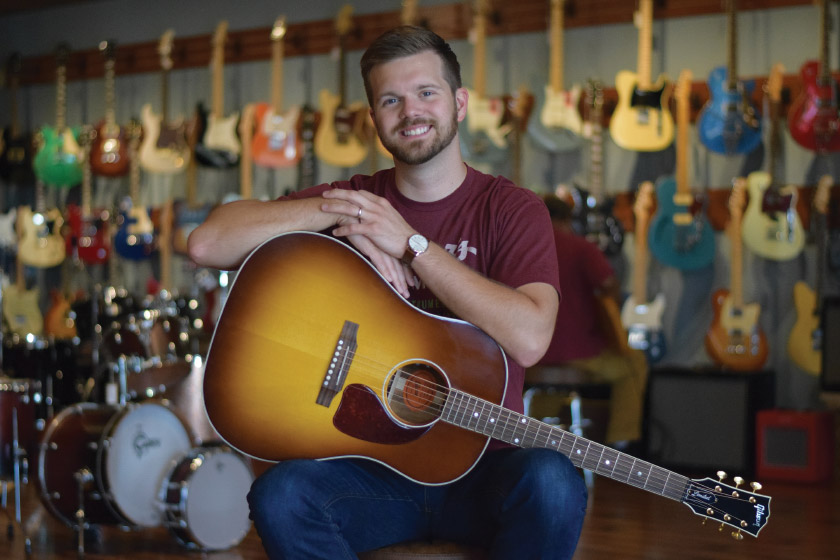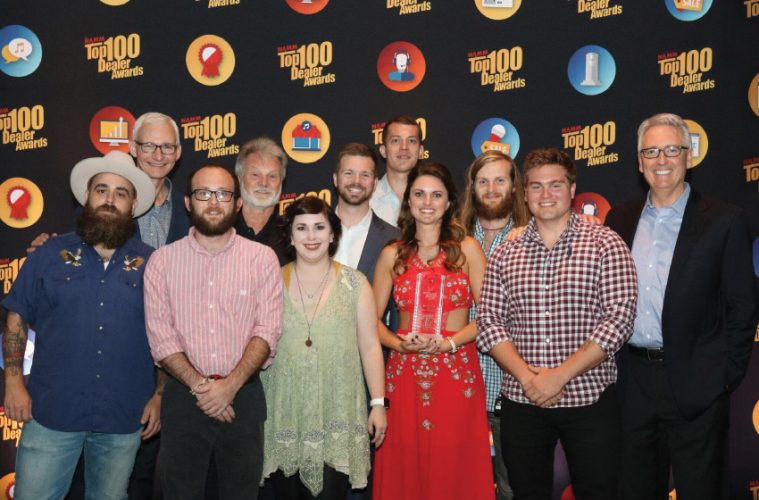Having grown up in a household where “my dad always had instruments around the house for me to pick up,” it’s not surprising that Tim Spicer would look to recreate his musical family on a much larger scale with the opening of his family-owned music store, Spicer’s Music.
“We wanted to be the bridge between music lovers, musicians, instruments and lessons,” explained Spicer, who opened the shop with his family — including his brother, Corey, and father, Tom — on December 1, 2012.
In their community of Auburn, Ala., only two other musical-instrument stores were operating in the area at the time. Spicer and his family recognized a need in their community for a place where people could go to share their love of music-making and embraced the opportunity, despite having no actual business experience. Spicer had recently graduated from college with a degree in Special Education when the store first opened, and his parents also came from a mental-health background, though all were active musicians.
This lack of business knowledge was no match for their love of music and their community, so the Spicer family pushed on undeterred. They pooled their own resources into opening the business, rather than seeking out investors and taking out loans.
“In 10 days, we signed our lease, built our showroom, bought hardware and software, stocked, and opened,” Spicer recalled. “We bought one initial order from KMC that we received the afternoon before our opening day. As a result, we opened with thin inventory, and we even brought many of our own instruments to display during the first few weeks.”
As they made money from instrument sales, that money was reinvested into the business and used to buy new inventory. All tasks were split between the family, and Spicer would run the store from open until close each day alongside his father. Within eight months, Spicer’s Music was successful enough to hire its first employee. Today, with a store that has doubled in size and an inventory that has increased by approximately 3,000 percent, according to Spicer, the store employs 13 people “and a really hard-working manager.” Additionally, 21 instructors teach more than 400 students per week in 13 lesson studios and a group room.
It’s those employees who Spicer feels really make his store stand out from the crowd. “There are many incredible stores in the world, and I am not sure if our store is all that ‘unique,’ but I do believe we have an incredible team of employees,” Spicer said. “I think our team makes us who we are.”
Beyond just the community Spicer creates within his music store, it’s also the community he fosters throughout his local area that helps Spicer’s Music live up to its motto, “Not Your Average Music Store.”
“We probably have more events than we should each year,” Spicer said, jokingly. Spicer’s Music usually has three to four events per month and at least one major event each quarter, both at the store and out in the local community. “We want to make sure that we are constantly seen engaging in anything that has to do with music or the arts,” Spicer said. “If we can’t personally make it to a music event happening in town, we send a street team member in our place.”
One such recent event was the second-annual Make Music Day, which took place this summer. Approximately 575 music-makers and music fans brought their voices and their instruments — everything from drums and percussion to guitars, banjos and brass — in an attempt to break the Guinness record for the largest performing rock band. Together with Sister Hazel vocalists, Drew Copeland and Ken Block, they performed that band’s memorable 1990s hit “All For You.” Although they didn’t break the record, this event accurately reflected Spicer’s mission to bring people together through music and make Spicer’s Music a place they care about.
“I want to create a business that betters my community through music, and I believe you should focus on making your store the epicenter of everything music related that goes on in your city. You have to engage your community, and teach them why it is important to shop with you,” said Spicer.
Looking to the future, Spicer recognizes that he still has a lot of learning and growing to do within the industry. He enjoys going to NAMM Shows and studying other stores to see what lessons he can glean from those who are more seasoned than he is.
“I’ve met some wonderful friends who own stores that have been around longer than I’ve been alive,” he said. “One of the things I have learned is how incredibly supportive the MI [industry] is. There are some incredibly inspirational leaders in this industry.”
One day, Spicer would love to take his business outside of the boundaries of Auburn, Ala., but for right now, he is focused on perfecting its current model, finding new ways to approach their goals and making Spicer’s Music the best it can be. And that means making sure that his store is indispensable in the eyes of his customers and his community.
“Many stores in our industry carry a lot of the same products and have relatively similar prices, so the one thing that sets us apart is how we make our customers feel. What emotion are we fostering? Emotion sells,” Spicer said.
“I want my customers to defend my store,” he continued. “If our store were to close, I want our community to notice.”


